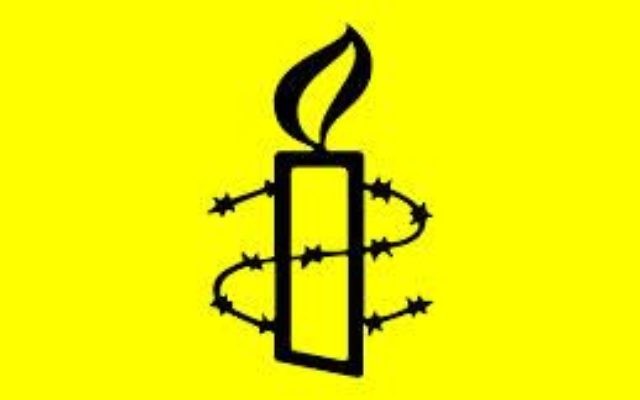IDF slams Amnesty report
The Israeli military has accused Amnesty International of showing a “complete lack of understanding” of the challenges it faces, after the human rights organisation unleashed one of its strongest ever attacks against Israel.
Amnesty has claimed that the Israel Defence Forces uses “unnecessary, arbitrary and brutal force against Palestinians.”
In its latest report, “Trigger-happy: Israel’s use of excessive force in the West Bank,” the group insists that the “pattern of killings and injuries of civilians needs urgently to be addressed and remedied.”
Philip Luther, Middle East and North Africa Director at Amnesty International said: “The report presents a body of evidence that shows a harrowing pattern of unlawful killings and unwarranted injuries of Palestinian civilians by Israeli forces in the West Bank.”
He added: “The frequency and persistence of arbitrary and abusive force against peaceful protesters in the West Bank by Israeli soldiers and police officers – and the impunity enjoyed by perpetrators – suggests that it is carried out as a matter of policy.”
As well as presenting its accusations against Israeli conduct, Amnesty reiterated its demand for the US, European Union, and the rest of the international community to stop all arms transfers to Israel. The Jerusalem-based NGO Monitor, a watchdog group that focuses on human rights groups called demand for an arms embargo a form of “political warfare against Israel.”
The IDF responded to Amnesty’s report by saying that any claim that there is a policy of unlawfully killing or wilfully injuring is disconnected from reality. It insisted that it operates in the West Bank in order to contain violence, and uses only the minimum amount of force needed for any situation.
“Where feasible the IDF contains this life-threatening violence using riot dispersal means, including – loud sirens, water cannons, sound grenades and tear gas,” it responded in a statement. “Only once these tools have been exhausted and human life and safety remain under threat, is the use of precision munitions authorised.”
It stated: “The IDF holds itself to the highest of professional standards and trains and equips itself as such. When there is any suspicion of wrongdoing, or breach of discipline, the IDF reviews, investigates and takes action where appropriate.”
Military figures say that Amnesty’s report was flawed because it discussed the IDF’s actions and alleged actions without considering the dangers of terror and sabotage that it is out to prevent when Palestinians are harmed.
They also say that Amnesty is wide of the mark blaming the IDF for the increase in Palestinian fatalities last year, as this actually stems from the fact that violence in the West Bank has increased, therefore increasing the need to respond. Amnesty “wholly ignored the substantial increase in Palestinian violence initiated over the past year,” said the IDF.
According to Israeli figures, 2013 saw a sharp increase in rock hurling incidents, gravely many of them potentially life-threatening. Some 132 Israelis were injured during 2013, almost double the year previous, resulting from 5000 incidents of rock throwing, half of which were towards main roads. In addition to rock throwing, there were 66 other terror attacks, including shootings, the planting of explosive devices, blunt weapon attacks and the abduction and murder of a soldier.
But Amnesty presents Palestinians as innocents. It claimed that it examined various deaths of Palestinians as a result of actions by the Israeli military, and none appeared to pose a “direct and immediate” threat to life.
This is despite the fact that an Israeli human rights organisation that is referenced repeatedly in the report, in its own publications, acknowledges acts of violence by some Palestinians recently killed by the IDF. B’Tselem notes, for example, that Saleh Samir ’Abd a-Rahman Yasin, killed in December, fired at soldiers before they killed him, and that Yunes Ahmad Mahmoud a-Radaydeh, who was killed two months earlier, had broken into a military base on a tractor. Soldiers fatally shot Amer Ibrahim Naji Nassar after he threw a Molotov cocktail at the checkpoint guard tower in April.
Amnesty did not discuss the context of Israeli operations, and instead presents them as often coming in response to peaceful protest. Israel has violated international human rights law, it claimed, by “using excessive force to stifle dissent and freedom of expression, resulting in a pattern of unlawful killings and injuries to civilians, including children.”
NGO Monitor has strongly criticised the Amnesty report for using vague and undefined criteria to make its claims, for generally lacking reliable methodology and reliable research methods, and for heavily relying on unverified claims made by other human rights groups.
“There is really no information in there,” NGO Monitor’s president Gerald Steinberg commented to The AJN.
“It’s looking for things to attack Israel on for political purposes – it’s trying desperately for ways to criticise Israel.”
NATHAN JEFFAY


comments